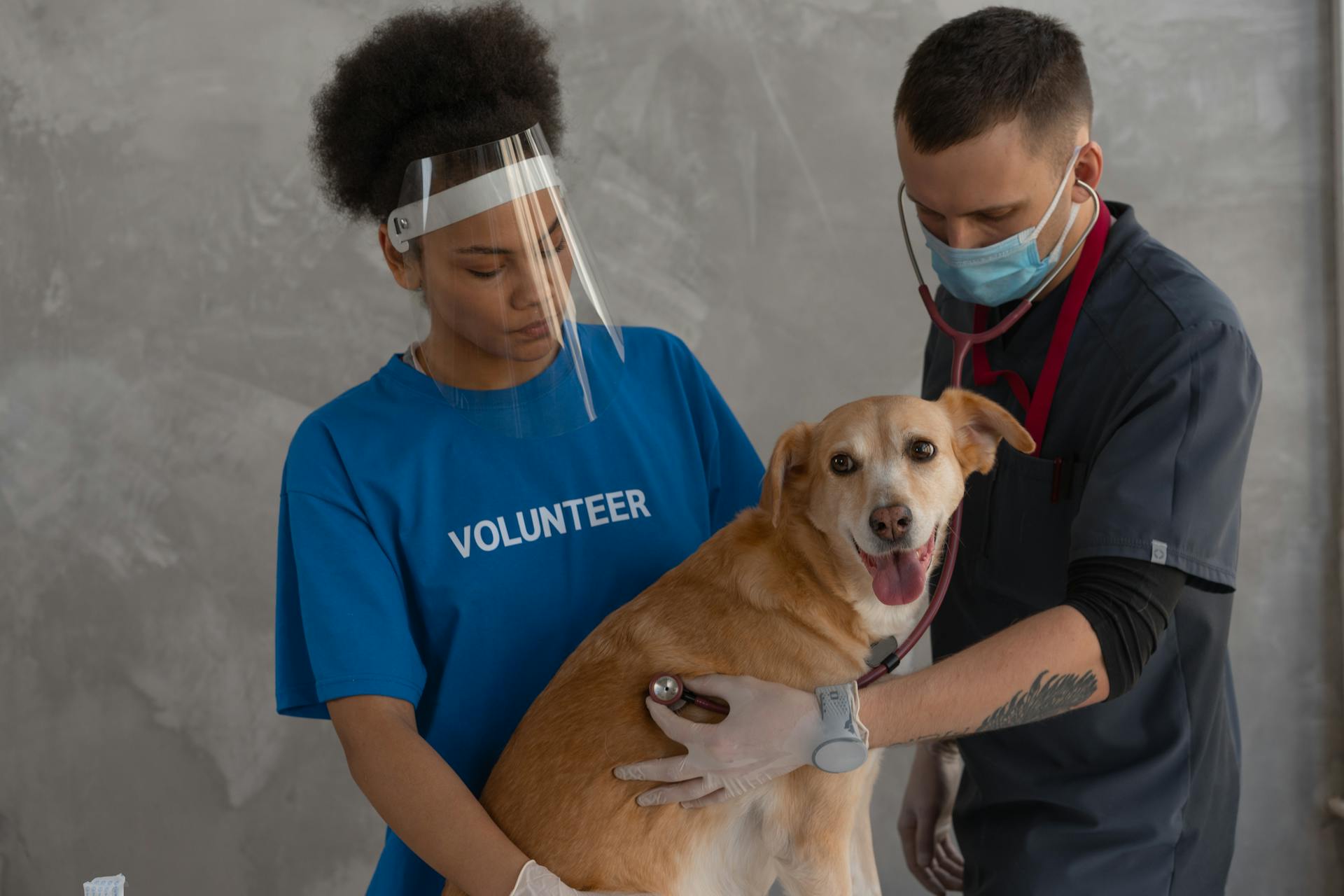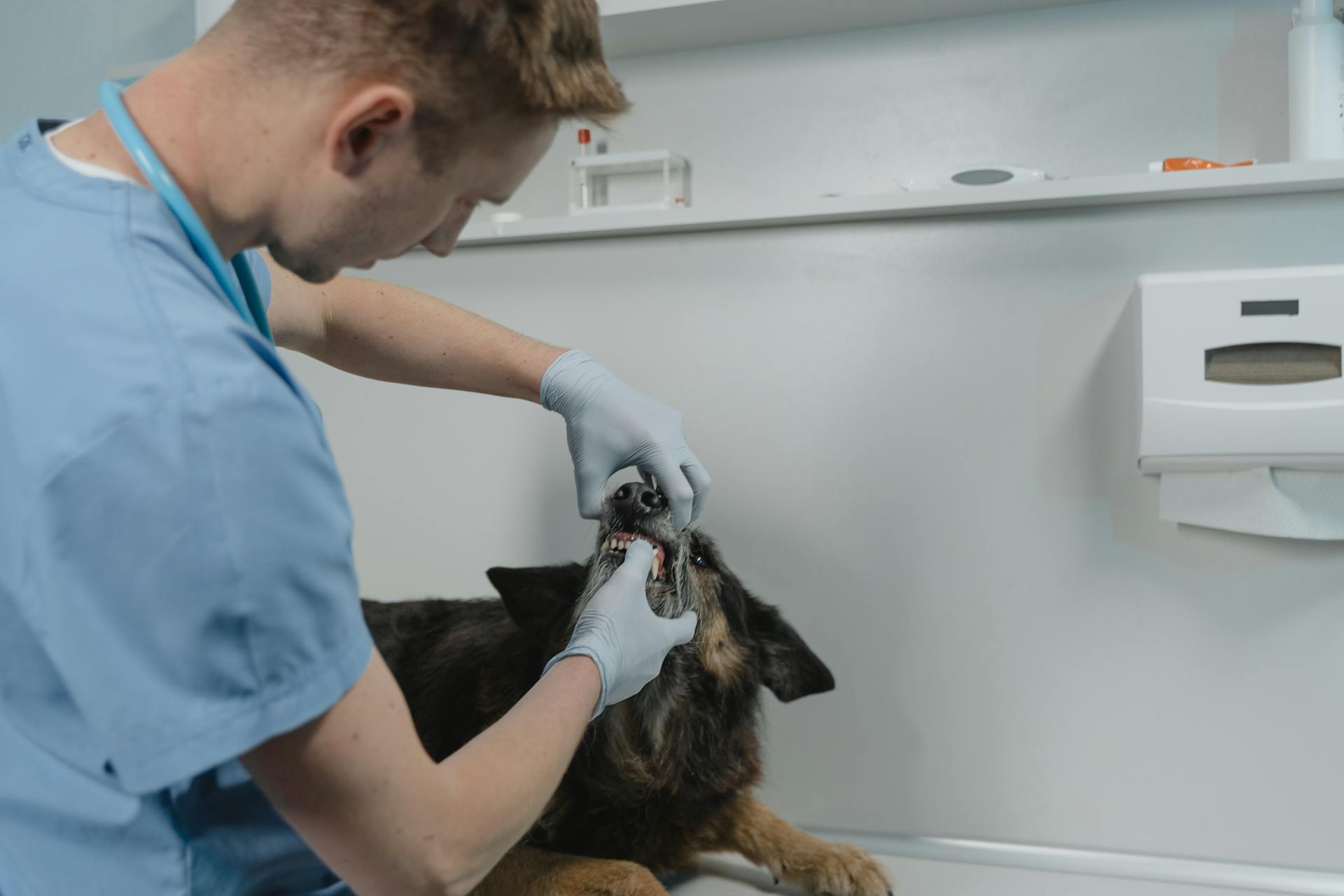
Dogs with pancreatitis may require antibiotics to treat secondary bacterial infections.
A diagnosis of pancreatitis is typically made through a combination of physical examination, complete blood count, serum biochemistry profile, and imaging studies.
The goal of treatment is to manage the underlying cause of pancreatitis, provide supportive care, and prevent secondary infections.
Antibiotics are often prescribed to treat secondary bacterial infections, which can occur in up to 30% of cases.
Diagnosis and Prognosis
Diagnosing pancreatitis in dogs can be tricky, but veterinarians use a combination of clinical signs, physical exams, and diagnostic tests to determine the best course of treatment.
A veterinarian will typically perform a thorough physical exam and recommend diagnostic testing to rule out other health conditions with similar symptoms.
Some common diagnostic tests used to diagnose pancreatitis include ultrasound, bloodwork, blood tests for pancreatic enzymes, radiographs and ultrasound, and surgery in some cases.
Here are some of the most common diagnostic tests used to diagnose pancreatitis:
- Ultrasound: detects close to 70% of cases in the acute phase
- Bloodwork: shows changes in liver, kidney, and electrolyte values
- Blood tests: for pancreatic enzymes, such as cPLI (canine pancreatic lipase immunoreactivity)
- Radiographs: rule out other injury or illness
Prognosis for dogs with pancreatitis depends largely on the severity of the condition, whether there are complications or other health conditions, and how soon treatment is initiated.
Most dogs with mild forms of pancreatitis recover without any long-term consequences, but severe episodes or repeated bouts of pancreatitis can lead to future complications.
How Vets Diagnose
Diagnosing pancreatitis can be tricky, but veterinarians use a combination of clinical signs, physical exams, and diagnostic tests to make a diagnosis.
A veterinarian will typically start with a thorough physical exam and may recommend diagnostic testing to rule out other health conditions with similar symptoms.
Ultrasound is often the best diagnostic tool to determine if your pet has signs of pancreatitis, detecting close to 70% of cases in the acute phase.
Bloodwork can show changes in liver, kidney, and electrolyte values, but it's not specific to pancreatitis and can be associated with many different diseases.
A specific blood test called cPLI (canine pancreatic lipase immunoreactivity) is more sensitive and specific, but it can take days to get results.
A "snap PLI" kit can provide a quick result, and if it's negative, you can rule out pancreatitis. However, if it's positive, you'll still need a cPLI to confirm a solid diagnosis.
Radiographs (x-rays) aren't useful in pancreatitis, except to rule out other injury or illness.
Here are some common diagnostic tools your vet may use:
- Ultrasound
- General bloodwork
- cPLI (canine pancreatic lipase immunoreactivity)
- Abdominal ultrasound
- Abdominal radiographs (X-rays)
It's essential to note that one positive lab test is not enough to diagnose pancreatitis, and your veterinarian will assess the full clinical picture to make a diagnosis.
Dog Prognosis and Recovery
Dogs with pancreatitis can fully recover and live normal, happy lives, but the risk of another bout remains high.
Prognosis depends on the severity of the pancreatitis, presence of complications, and how soon treatment is initiated.
Most dogs with mild pancreatitis recover without long-term consequences, but severe episodes or repeated bouts can lead to future complications.
Treatment and management are crucial for a dog to live a normal life with pancreatitis.
Every dog is different, so it's essential to check with your veterinarian before making any diet changes or starting new treatments.
With proper care, most dogs can enjoy a great quality of life and participate in their favorite activities.
Here's an interesting read: Pancreatitis in Dogs Treatment at Home
Understanding the Condition
Pancreatitis in dogs can happen suddenly, causing severe symptoms that require immediate veterinary care. Pancreatitis usually happens quickly, but it can also occur over weeks to months.
The symptoms of acute pancreatitis start quickly and are often more severe than those of chronic pancreatitis. Pancreatitis can be a life-threatening condition, making it essential for dog owners to recognize the signs.
Recognizing the signs of pancreatitis is crucial, as it can be severe and often requires veterinary care.
What's in Dogs?
Pancreatitis in dogs is a prevalent condition marked by inflammation of the pancreas, which occurs when digestive enzymes activate prematurely within the pancreas.
The canine pancreas plays two pivotal roles: producing hormones like insulin and glucagon, crucial for blood sugar regulation, and producing digestive enzymes used by the stomach and intestines to break down fat, proteins, and carbohydrates.
This premature activation of enzymes can lead to self-digestion of the pancreas and harm to adjacent tissues of the liver, gallbladder, and intestines.

Pancreatitis in dogs can happen suddenly or over weeks to months, and recognizing the signs is essential for all dog owners because it can be severe and often requires veterinary care.
Symptoms of pancreatitis can range from mild to life-threatening, and acute pancreatitis usually has more severe symptoms than chronic pancreatitis.
The main difference between acute and chronic pancreatitis is the onset: acute pancreatitis comes on suddenly, while chronic pancreatitis develops slowly over time.
Curious to learn more? Check out: Pancreatitis in Senior Dogs
Disease Causes in Dogs
Dogs can develop pancreatitis due to a variety of causes, and it's not always easy to pinpoint the exact reason.
Eating foods that are not part of their regular diet, such as people food or garbage, can trigger pancreatitis in dogs. This is known as dietary indiscretion.
High-fat diets can also contribute to pancreatitis in dogs. Eating too many fatty foods can put a strain on the pancreas, leading to inflammation.
Certain medications, including anti-seizure medications and chemotherapy drugs, can increase a dog's risk of developing pancreatitis.
Take a look at this: Pancreatitis in Dogs Not Eating
Exposure to toxins, such as insecticides or chocolate, can also cause pancreatitis in dogs. And, if your dog is infected with bacteria, viruses, or parasites, it can lead to pancreatitis.
Trauma to the abdomen, such as from a car accident, can also cause pancreatitis in dogs. And, being overweight or obese can increase a dog's risk of developing pancreatitis.
Some breeds, including miniature schnauzers and Yorkshire terriers, are more prone to pancreatitis. And, dogs with certain health conditions, such as hypothyroidism or diabetes mellitus, are also at higher risk.
Here are some specific breeds that are more likely to develop pancreatitis:
- Miniature schnauzers
- Yorkshire terriers
- Cocker spaniels
- Dachshunds
- Poodles
- Bichon Frise
- Shetland sheepdogs
Treatment and Recovery
Treatment for pancreatitis in dogs aims to rest the pancreas and allow it to heal itself.
The type of treatment depends on the severity of the disease, with mild cases often recovering without long-term consequences.
Intravenous fluids are administered to maintain hydration, and vomiting and discomfort are controlled with medications.
Explore further: Pancreatitis in Dogs Treatment Cost
Antibiotics are often administered to prevent secondary infections, which can be a complication in severe cases.
A transfusion of plasma may be recommended in severe cases to help control inflammation.
Treatment typically involves withholding all oral food, fluids, and medications to allow the pancreas to remain quiet.
Most dogs with mild forms of pancreatitis recover without any long-term consequences, but severe episodes or repeated bouts can lead to future complications.
The risk of another bout of pancreatitis remains high, even after recovery, so ongoing management is crucial.
Helping your dog recover from pancreatitis requires a tailored approach, so be sure to check with your veterinarian before making any changes to their diet or treatment plan.
Signs in Pets
If your furry friend is showing signs of pancreatitis, it's essential to take action quickly. Decreased or absent appetite is a common clinical sign, as many dogs with pancreatitis lose their appetite due to abdominal pain and nausea.
Dogs with pancreatitis often experience episodes of nausea and repetitive vomiting, which can lead to dehydration if not addressed promptly. Abdominal pain can range from mild to intense, and dogs may express it in various ways, such as yelping when their abdomen is touched or assuming a "praying position."
Abdominal distention, or bloating, is another possible sign, while abnormal poop or diarrhea can result in greasy stools and/or mild to severe diarrhea. Fever is a common symptom that often accompanies inflammation, and dogs with pancreatitis may exhibit lethargy or weakness.
Here are some common signs of pancreatitis in pets:
- Abdominal pain
- Hunching
- Fever
- Loss of appetite
- Dehydration
- Diarrhea
- Bloody stool
- Vomiting
- Lethargy or restlessness
Keep in mind that dogs with pancreatitis don't always exhibit all of these symptoms, and they may just have one or two. If you suspect your dog is showing signs of pancreatitis, it's crucial to seek veterinary care as soon as possible, as this condition can be life-threatening.
Frequently Asked Questions
Which antibiotic is best for pancreatitis?
For treating pancreatitis, imipenem is a preferred antibiotic option due to its efficacy in reducing sepsis rates. It's often recommended alongside ciprofloxacin and ofloxacin for effective treatment.
What is the best medication for dogs with pancreatitis?
For dogs with pancreatitis, medications like maropitant and ondansetron can help manage symptoms, but appetite stimulants like mirtazapine or capromorelin may also be beneficial to support recovery. Consult with a veterinarian to determine the best treatment plan for your dog.
Is metronidazole good for dogs with pancreatitis?
Metronidazole may be helpful in relieving bacterial infections in dogs with pancreatitis, especially when left untreated for a few days. Consult a veterinarian for proper diagnosis and treatment
Featured Images: pexels.com


